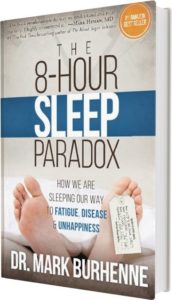Table of Contents[Hide][Show]
Night Guard Question: I’m getting a night guard due to my horrible grinding and clenching. This will be my second try. Tips on adjusting to it?
– Paula via Twitter.
Answer: Before I answer how to get used to the night guard, I have to recommend that you first find the-the reason that you don’t like the night guard.
Does it give you a gag reflex?
Is it the bulk in the mouth that is bothersome?
Chances are, whatever it is that’s irritating you about it is an indication that you’re not sleeping deeply, especially since you’ve said that this is your second try with a night guard.
If you were in deep sleep, you wouldn’t notice the night guard at all. It’s only when you’re in a light stage sleep that you notice little irritants — like a night guard or a dripping faucet, a ticking clock, or full bladder.
If you were one of my patients, my approach would be to first find out what’s causing the clenching and grinding.
The night guard is going to be a band aid solution. I recommend you get to the root of your grinding and clenching because a night guard will protect your teeth but not your muscles and your jaw joint, which will continue to wear out and be in a lot of pain as you continue to clench and grind every night while you sleep (even though you are wearing a guard to protect your teeth)
Plus, clenching and grinding are common indicators for sleep apnea.
What Happens If I Grind and Clench But Don’t Wear a Night Guard?
You’re doing a great thing by considering a night guard because you’re thinking “prevention” which is the best thing you can do with your health. As I’m sure you already know since you’ve taken steps to get a night guard, leaving the grinding and clenching untreated would eventually lead to your teeth flattening as they got more and more worn down. Teeth can even get worn down to the nerve, leading to tooth sensitivity to hot and cold, cracks in the teeth, receding gums, losing teeth, and a whole lot of jaw and mouth pain.
Get Dr. B’s Dental Health Tips
Free weekly dental health advice in your inbox, plus 10 Insider Secrets to Dental Care as a free download when you sign up

Treating the Root Cause of Grinding and Clenching
Has your dentist recommended that you get a sleep study? The new theory in dentistry is that grinding and clenching are common indicators for sleep apnea and the brain is trying to reopen a partially obstructed airway.
Keep in mind, the diagnosis will need to be made by a sleep medicine MD, but this is a critical first step I recommend in treating the root cause of your grinding and clenching.
What Does Grinding Have to Do With Sleep Apnea?
As you approach the deepest stages of sleep, every muscle in your body begins to relax completely. Your neck muscles and muscles around your airway lose their tone. The jaw is no longer held forward. The tongue expands as it relaxes and falls back, partially or completely covering the opening of your airway.
Here’s where grinding and clenching come in to save your life. In order to save you, the unconscious brain activates the jaw muscles to grind and clench so you can breathe again.
This can repeat several times throughout the night and, even if it only happens once, it means you miss out on letting your body get to that deep stage of sleep, which, when achieved, leads complete paralyzation of all the muscles in your body.
You miss out on the deep sleep that is responsible for secreting human growth hormone which slows the aging process by repairing tissue damage in the brain and body. After just one night of missing out on this restorative deep sleep you will awake in a compromised state, both mentally and physically.
You are completely unconscious while it’s happening, but this entire process of the brain realizing it’s suffocating, then grinding and clenching to reopen the airway, several times each hour, is emotionally exhausting. It depletes the adrenal glands. Cumulative damage can lead to depression, mood disorders, suppression of the immune system, and eventually dementia.
Treating Grinding with OAT (Oral Appliance Therapy)
You can easily treat grinding and clenching with an oral appliance similar to a retainer that you wear during sleep and it keeps the jaw protruded (kind of like a bulldog) so that, when your muscles relax when approaching deep sleep, your jaw and tongue muscles relax but the jaw stays in a protruded position, supporting the airway and not blocking it so that your breathing is unobstructed.
When grinding, by definition, you are coming out of deep sleep and becoming conscious of your grinding your teeth or grinding on a night guard.
The minute the airway is supported and kept from collapsing, the grinding will stop.
How to Adjust to Sleeping With a Night Guard
After you explore the sleep apnea and grinding connection, if you still decide to proceed with using the night guard, here’s what I recommend to get used to it:
- Have your dentist start out with a night guard with a thin material, like Invisalign, since this will take up less bulk in the mouth and will be easier to get used to.
- Have your dentist make both an upper and a lower night guard so you can wear just one or the other and see which one is more comfortable and then move to getting a thicker one made eventually, after you’ve adjusted to the feeling. Many times it’s merely a function of whether it’s an upper or lower that determines the comfort and acceptance of the device. Strange, but in actual practice true.
- Put the night guard in right before bed to minimize the chances you will eventually find it bothersome. Many people fall asleep in 5 minutes.
Hang in there for at least 30 days . After that, you’ve created a habit and you’ll will be used to wearing it. Trying it a few hours here and there inconsistently isn’t going to work.
Getting to the root cause of why you’re grinding and clenching will result in the best result because, even once you do adjust to the night guard, it will only protect your teeth, but it won’t do anything to prevent your muscles and jaw joint from working overtime.
When treating a health issue it’s always best to treat, no, in this case, eliminate the cause.
A night guard only treats the symptoms, not the cause!
Mark Burhenne DDS
Why I No Longer Prescribe a Night Guard for GrindingWant to learn more? Check out my #1 Amazon bestselling book, The 8-Hour Sleep Paradox.
 This book will teach you how to achieve your highest quality sleep to become your best, brightest, most capable self.
This book will teach you how to achieve your highest quality sleep to become your best, brightest, most capable self.
This 3-step program will show you how you can get the kind of sleep that unlocks your ability to:
- Achieve your perfect weight by suppressing your appetite naturally
- Slow down the aging process
- Wake up happy and refreshed every morning
- Improve your energy levels, concentration and mental focus
- End daytime sleepiness and brain fog

 How to Scrape Your Tongue for Optimal Oral Health
How to Scrape Your Tongue for Optimal Oral Health